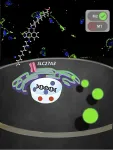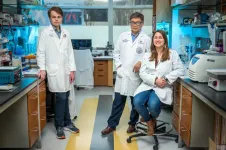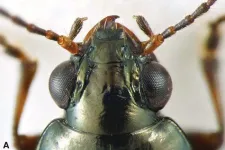Labeling macrophages associated with cancer progression using a selective dye
2023-03-28
(Press-News.org)
M1 and M2 are activated macrophages that protect our immune system and maintain homeostasis. Interestingly, they are characterized by distinct and opposing phenotypes. M1 macrophages are known for their bactericidal and tumoricidal properties by secreting pro-inflammatory cytokines, while M2 macrophages facilitate immunosuppressive responses and help cancer progression. As such, reprogramming macrophages from M2 to M1 phenotype has been regarded as a significant interest in the view of potential cancer treatment methods. Though it has been challenging to distinguish between living M1 and M2 using fluorescent molecules until now, a research team at POSTECH developed a novel probe, selectively dyeing M2 over M1 for the first time.
The work of the team, comprised of Professor Young-Tae Chang (Department of Chemistry), Professor Nam-Young Kang (Department of Convergence IT Engineering), Professor Haw-Young Kwon, Heewon Cho and Sun Hyeok Lee from the Department of Interdisciplinary Bioscience & Bioengineering at POSTECH, has developed the first M2 selective probe CDg18 with a novel mechanism. The research findings were recently published in the Journal of the American Chemical Society, one of the most renowned journals in the field of chemistry.
Fluorescent probes are chemical compounds that are able to emit light upon recognition of specific ions or materials. The discrimination of living human cells is of importance, not only in clinical diagnosis but the pursuit of effective treatment strategies for infections or inflammatory conditions.
Macrophages are specialized immune cells, exhibiting remarkable plasticity in response to environmental stimuli. The activated macrophages broadly categorize into two different subsets, M1 and M2. M1 macrophages have aggressive functions against invaders such as bacteria and tumors while M2 macrophages are anti-inflammatory cells, which promote tumor immunity.
Tumor-associated macrophages represent a critical determinant to form tumor microenvironment, which is a typical example of M2 cells. Despite the evident importance of M2 macrophages, real-time monitoring of M2 had remained a challenge.
The team developed a novel M2 probe, CDg18, by employing a unique mechanism of Gating-Oriented Live-cell Distinction (GOLD) through the specific overexpressed fatty acid transporter in M2. To demonstrate the potential of CDg18, the team visualized the phenotypic shift of M2 toward M1 using a resveratrol analog HS-1973 as a reprogramming effector.
The simultaneous use of both CDg18 and the M1 probe, CDr17, facilitated dual-color monitoring macrophage reprogramming in real time that was defined by the diminishing M2 character and emergence of M1 markers.
Professor Young-Tae Chang who led the team explained, “The M2 probe (and the M1 probe previously developed) developed by the team in this research enables the monitoring of M1 and M2 distribution in cancerous tissues as well as their changes over time.” He added, “This represents a novel technological approach in addressing the existing limitations in this field.”
This study was sponsored by the Institute for Basic Science, the Ministry of Science and ICT, and the Hyundai Motor Chung Mong-Koo Foundation.
END
ELSE PRESS RELEASES FROM THIS DATE:
2023-03-28
People reveal more personal information when you ask them the same questions a second time – according to new research from the University of East Anglia.
A new study published today reveals how simple repetition can make people over-disclose, and potentially put themselves at risk of identity theft and cyber crime.
The research team say that understanding why people disclose personal data could help inform measures to address the problem.
From subscribing to online newspapers to completing customer surveys, our personal data is being mined continuously; the world’s most valuable resource is no longer oil, but data.
But for consumers who provide their personal ...
2023-03-28
In February of this year, Graphene Flagship associated member Graphenest and manufacturing company Hubron International entered a new strategic partnership. Their shared aim is to explore the development and commercialization of graphene-based polymer masterbatch and compounds with unprecedented electromagnetic interference (EMI) shielding performance for electronic enclosures manufacturing.
This new product line will start with a graphene-based thermoplastic suitable to be implemented as a remarkable EMI shielding solution in medium-high and high frequencies (for 5G and beyond).
The agreement brings together Graphenest’s knowledge around graphene ...
2023-03-28
A new drug combination for men with advanced prostate cancer has shown sustained increase in survival rates.
The results from the clinical trial of ENZAMET, co-chaired by Professor Christopher Sweeney, Director of the South Australian immunoGENomics Cancer Institute (SAiGENCI) that operates within the University of Adelaide, have been published today in The Lancet Oncology.
For people with metastatic hormone-sensitive prostate cancer, the addition of an androgen receptor blocker with enzalutamide ...
2023-03-28
AUGUSTA, Ga. (March 28, 2023) – Cancer that has spread to areas like the lungs can apply the brakes to a natural pathway that should recruit killer T cells directly to where it has metastasized, scientists report.
That newly found strategy used by tumors that have spread — and are consequently more deadly — may help explain why sometimes promising immunotherapies designed to help the immune system kill cancer don’t, says Kebin Liu, PhD, cancer immunologist in the Department of Biochemistry and Molecular Biology at the Medical College of Georgia.
It also may mean an additional therapeutic maneuver is needed to stop some tumors, which ...
2023-03-27
FOR IMMEDIATE RELEASE
March 27, 2023
Contact:
Jillian McKoy, jpmckoy@bu.edu
Michael Saunders, msaunder@bu.edu
##
Growing evidence suggests that e-cigarettes may serve as a less harmful alternative to smoking traditional cigarettes, but socioeconomic and racial inequities in cigarette and e-cigarette use are preventing certain populations from reaping these potential health benefits, according to a new study led by Boston University School of Public Health (BUSPH) and the Keck School of Medicine of the University of Southern California (Keck School of Medicine of USC).
Published in the American Journal of Preventive ...
2023-03-27
Berkeley — When University of California, Berkeley, entomologist Kipling Will first heard that former Gov. Jerry Brown was hosting field scientists on his Colusa County ranch, he jumped at the chance to hunt for beetles on the property.
“I reached out and said, ‘Hey, I want to sample your beetles,’” Will said. “And [Brown] was quite game to let me come up there.”
Will, a professor of environmental science, policy and management, has travelled to all corners of California ...
2023-03-27
Reston, VA—A new article in The Journal of Nuclear Medicine explores the potential for using ChatGPT, an artificial intelligence chatbot, in the field of nuclear medicine and molecular imaging. In the article, Irène Buvat, PhD, and Wolfgang Weber, MD, PhD, report on discussions they held with ChatGPT regarding several nuclear medicine and molecular imaging topics and provide their commentary on the pros and cons of using the chatbot.
Developed by OpenAI, ChatGPT is a natural language processing chatbot that can intelligently respond to questions. ...
2023-03-27
“Ultimately, while both chronological and biological age appear to be important determinants of vaccine-preventable outcomes in older adults, the underlying context and mechanisms of their effects remain unclear.”
BUFFALO, NY- March 27, 2023 – A new editorial paper was published in Aging (listed by MEDLINE/PubMed as "Aging (Albany NY)" and "Aging-US" by Web of Science) Volume 15, Issue 5, entitled, “Parsing chronological and biological age effects on vaccine responses.”
Researchers ...
2023-03-27
A University of Massachusetts Amherst nutrition scientist who has spent his career studying breast milk has demonstrated how beneficial microbes in the gut of infants use nitrogen from human milk to support pediatric nutrition and development.
“The molecules in breast milk not only feed the baby but also feed the baby’s microbiome,” says David Sela, associate professor of food science and director of the Fergus M. Clydesdale Center for Foods for Health and Wellness. “This ...
2023-03-27
How often do you glance at your neighborhood app, like Nextdoor or others, and learn about some crime in your area? Surely, it was not the intention of the app developers, but every time you hear of a crime nearby you might think that crime in your area is rampant. A new study by a University of Houston psychologist indicates that is exactly how the mind works – those helpful and popular neighborhood apps are actually increasing perceptions of crime rates that may not be as high as you think.
“Neighborhood ...
LAST 30 PRESS RELEASES:
[Press-News.org] Labeling macrophages associated with cancer progression using a selective dye









